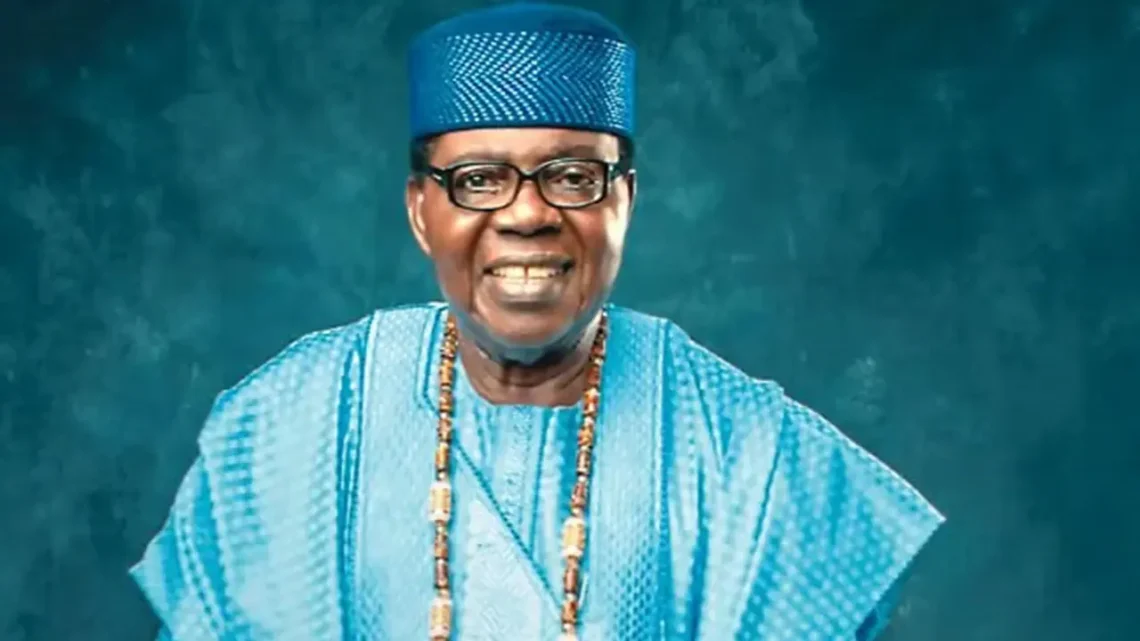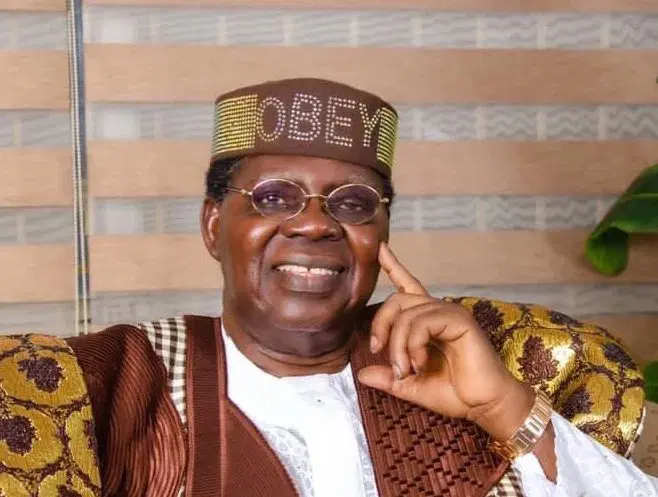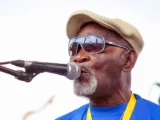
Ebenezer Obey Biography: Age, Wife, Children, Net Worth, Parents, Albums, Songs, Family
0 Posted By Kaptain KushBiography
Ebenezer Obey, born Ebenezer Remilekun Aremu Olasupo Obey-Fabiyi April 3, 1942, in Idogo, Ogun State, Nigeria, is a legendary Nigerian musician and pioneer of jùjú music.
Known as “Chief Commander,” he began his career in the 1950s, blending traditional Yoruba rhythms with highlife, jazz, and Christian themes.
Trending Now!!:
- Tim Bendzko Biography: Age, Career, Height, Net Worth, Songs, Children, Parents, Spouse
- Futuristic (rapper) Bio: Songs, Age, Religion, Net Worth, Parents, Wife, Height, Ethnicity, Albums
- Brittany Snow Biography: Husband, Age, Parents, Net Worth, Movies, Height, Children, Songs, Sexuality
- ECKO (rapper) Biography: Age, Songs, Girlfriend, Net Worth, Height, Parents, Albums
- Blac Youngsta Biography: Parents, Age, Net Worth, Height, Girlfriend, Albums, Songs, Brother
With a career spanning over six decades, Obey has released numerous albums, including hits like “Olomi Gbo Temi” and “Aimasiko.” His music often conveys moral and social messages, earning him widespread acclaim.
Later in life, he became an evangelist, founding the Decross Gospel Mission, while continuing to perform and influence generations of artists.
| Nigerian musician | |
| Ebenezer Obey | |
|---|---|
 | |
| Wiki Facts & About Data | |
| Real Name: | Ebenezer Remilekun Aremu Olasupo Obey-Fabiyi |
| Stage Name: | Ebenezer Obey |
| Born: | 3 April 1942 (age 83 years old) |
| Place of Birth: | Yewa North, Ogun State, Nigeria |
| State Of Origin: | Ogun State |
| Nationality: | Nigerian |
| Education: | Methodist Primary School |
| Height: | N/A |
| Parents: | Nathaniel Olasewo Fabiyi, Abigail Oyindamola Fabiyi |
| Siblings: | N/A |
| Spouse: | Juliana Olaide Olufade (m. 1963) |
| Girlfriend • Partner: | Not Dating |
| Children: | Folarin Obey, Olubukola Obey Olaiya, Oluwashina Obey |
| Occupation: | Musician |
| Net Worth: | $1 million-$5 million (USD) |
Early Life & Education
Ebenezer Remilekun Aremu Olasupo Obey-Fabiyi, professionally known as Ebenezer Obey or the “Chief Commander,” was born on April 3, 1942, in Idogo, a village in the Yewa North Local Government Area of Ogun State, Nigeria.
Some sources suggest he was delivered at Massey Street Hospital (now Massey Street Children’s Hospital) in Lagos, but he was raised in his family’s hometown of Idogo. His early years were shaped by a modest, rural upbringing in post-colonial Nigeria, where he developed a passion for music through local church activities and community gatherings.
Obey hails from the Egba-Yoruba ethnic group, specifically the Owu subgroup of the Egba people, with roots tracing back to the Keesi quarters of Abeokuta, the historic capital of the Egba kingdom. This Yoruba heritage deeply influenced his music, infusing it with traditional proverbs, rhythms, and social commentary.
From a religious standpoint, Obey was raised in a Christian household, likely Methodist, given his early involvement in church choirs and Sunday school programs. This foundation later evolved into a profound commitment to evangelical Christianity; in the early 1990s, he retired from secular jùjú music to focus on gospel ministry, founding the Decross Gospel Mission and becoming an ordained evangelist.
His parents were Nathaniel Olasewo Fabiyi, a skilled carpenter and community figure from Abeokuta who had relocated to Idogo for work, and Abigail Oyindamola Fabiyi (also referred to as Juliana Olaide Fabiyi in some accounts), a devoted homemaker who instilled strong moral values in the family.
Regarding education, Obey received a basic formal schooling primarily at the Methodist Primary School in Idogo, where he excelled as a student monitor—earning his nickname “Obey” from peers for his authoritative yet fair demeanor while enforcing rules. He later attended schools in Mushin (a suburb of Lagos) and Abeokuta, completing elementary education but not pursuing higher formal studies.
His true “education” came informally through music: as a child, the hymns and rhythms of his church’s Sunday school inspired him to join the choir and lead the school band, laying the groundwork for his lifelong career. By his mid-teens in the 1950s, he had relocated to Lagos, apprenticing under jùjú pioneer Fatai Rolling Dollar, which honed his professional skills far beyond classroom walls.
Career
Ebenezer Obey, fondly known as the “Chief Commander,” is a towering figure in Nigerian music whose career spans over six decades. A pioneer of jùjú music, he masterfully fused Yoruba percussion, highlife influences, and Western instrumentation to create a timeless sound rooted in storytelling, spirituality, and innovation.
Born into Yoruba culture, Obey moved to Lagos as a teenager in the mid-1950s to pursue music. He apprenticed under jùjú legend Fatai Rolling Dollar, where he honed his skills in guitar and percussion. By 1957, at just 15, he joined the Federal Rhythm Band, gaining valuable experience in highlife music.
In 1964, he formed his own band, the International Brothers, where he introduced a new, more refined jùjú style. His sound—characterized by melodic guitar riffs, talking drums, and proverbs—won the hearts of many. Songs like “Ewa Wo Ohun Ojuri” blended traditional Yoruba rhythms with modern appeal, earning him a loyal following.
By 1970, his band was renamed the Inter-Reformers Band, ushering in the peak of his commercial success. With albums such as Aiye Alajobi (1971), Board Members (1972), and On The Town (1974), Obey captured the spirit of post-independence Nigeria.
His music championed themes like unity, gratitude, morality, and social awareness. Hits like “Olomi Gbo Temi” and “Aimasiko” became cultural anthems, while his long, improvisational performances held audiences spellbound.
His friendly rivalry with King Sunny Adé pushed the evolution of jùjú music further, inspiring the use of larger ensembles, electric guitars, and more complex arrangements. By the 1980s, international tours and record deals with Decca West Africa made his music popular beyond Nigeria.
In the early 1990s, Obey transitioned from secular music to ministry, becoming an ordained evangelist and founding the Decross Gospel Mission. His gospel albums, such as What God Has Joined Together (1995), blended jùjú’s rhythm with Christian teachings, honoring his Methodist upbringing.
Though semi-retired, he made selective returns to music in the 2000s, releasing projects like The Legend Lives On (2012) and performing on global stages. Over his career, he has released more than 100 albums, including classics like “Ketekete” and “Eda To Mose Okunkun.” He also mentored emerging artists and left a profound influence on contemporary Afrobeats.
In 2011, he founded the Ebenezer Obey Music Foundation to preserve jùjú music and support aspiring musicians. Despite challenges such as piracy and the decline of vinyl, his ability to evolve kept him relevant across generations.
Honored with national awards like the Member of the Order of the Niger (MON) and multiple honorary doctorates, Ebenezer Obey’s legacy remains a powerful blend of Yoruba culture, social commentary, and spirituality — inspiring musicians and fans around the world.
Social Media
- Instagram: Chief Commander Ebenezer Obey (@ebenezerobeymfr)
Personal Life
Ebenezer Obey, born Ebenezer Remilekun Aremu Olasupo Obey-Fabiyi on April 3, 1942, in Idogo, Ogun State, Nigeria, is 83 years old.
A revered figure in Nigerian music, Obey‘s personal life has been marked by deep family commitments, spiritual devotion, and a private demeanor that keeps much of his early romantic history out of the public eye.
Obey has been married only once, to Juliana Olaide Olufade, whom he wed in 1963 at the age of 21, while she was 19.
Juliana, later known as Lady Evangelist Juliana Obey-Fabiyi, was a pillar of support in his career and shared his Christian faith, often participating in his gospel ministry. Tragically, she passed away on August 23, 2011, at the age of 67, at Lagos State University Teaching Hospital after a brief illness.
There are no records of subsequent marriages or remarriages for Obey, who has remained single since her death, focusing instead on his music, ministry, and family.
Regarding children, Obey and Juliana were blessed with at least three known offspring: sons Oluwashina Obey and Folarin Obey, and daughter Olubukola Obey Olaiya.
Broader accounts describe them having “several children and grandchildren,” though specific names and numbers beyond this trio are not widely detailed in public sources, reflecting Obey’s preference for privacy.
His family has occasionally appeared in media, such as during celebrations of his milestones, underscoring their close-knit bond.
Net Worth
Ebenezer Obey, the legendary Nigerian jùjú musician known as the “Chief Commander,” has built a substantial fortune over his six-decade career through album sales, live performances, international tours, and his gospel ministry.
His net worth is estimated between $1 million and $5 million USD, with recent figures citing approximately $5.05 million. These estimates reflect earnings from over 100 albums, including hits like “Olomi Gbo Temi,” alongside honors such as a Grammy nomination and national awards.
Despite the music industry’s challenges like piracy, Obey‘s cultural impact and selective engagements continue to sustain his financial legacy, though exact figures remain speculative due to limited public disclosures.
Discography
Albums
- In London (1970)
- On The Town (1970)
- Aiye Alajobi (1971)
- Board Members (1972)
- Vol.4: Aiye Wa A Toro (1972)
- In London Vol. 3 (1972)
- Odun Keresimesi (1972)
- And His Miliki Sound (1973)
- The Horse, The Man and His Son (1973)
- E Je Ka Gbo T’Oluwa (1973)
- Adeventure of Mr. Music (1973)
- Mo Tun Gbe De (1973)
- Inter-Reformers A Tunde (1974)
- Eko Ila (1974)
- Around the World (1974)
- Iwalka Ko Pe (1974)
- Mukulu Muke Maa Jo (1975)
- Ota Mi Dehin Lehin Mi (1975)
- Alo Mi Alo (1975)
- Edumare Dari Jiwon (1975)
- Late Great Murtara Murtala Ramat Muhammed (1976)
- Operation Feed The Nation (1976)
- Eda To Mose Okunkun (1977)
- Immortal Sings for Travellers (1977)
- Adam and Eve (1977)
- Igba Owuro Lawa (1978)
- Oluwa Ni Olusa Aguntan Mi (1978)
- No Place Be Like My Country Nigeria (1978)
- Igba Laiye (1979)
- Sky (1979)
- E Wa Kiye Soro Mi (1979)
- Omo Mi Gbo Temi (1979)
- Leave Everything to God (1980)
- Current Affairs (1980)
- Sound of the Moment (1980)
- Eyi Yato (1980)
- Joy of Salvation (1981)
- What God Has Joined Together (1981)
- Celebration (1982)
- Austerity (1982)
- Precious Gift (1982)
- Ambition (1983)
- Singing for the People (1983)
- Je Ka Jo (1983)
- Thank You (Ose) (1983)
- The Only Condition to Save Nigeria (1984)
- Solution (1984)
- Peace (1984)
- Security (1984)
- My Vision (1984)
- Gbeja Mi Eledumare (1986)
- Satisfaction (1986)
- Providence (1986)
- Aimasiko (1987)
- Immortality (1987)
- Victory (1987)
- Patience (1987)
- Determination (1988)
- Vanity (1988)
- Formula 0-1-0 (1989)
- Juju Jubilee (1989)
- Count Your Blessing (1990)
- On the Rock (1990)
- Womanhood (1991)
- Good News (1993)
- I Am a Winner (1994)
- Walking Over (1994)
- The Legend (1995)
- What God Has Joined Together (1995, re-release/gospel)
- Millennial Blessings (1999)
- Promised Land (2000)
- Ase Oluwa (2002)
- The Legend Lives On (2012)
Singles
- Ewa Wo Ohun Ojuri (1964)
- Aiye Gba Jeje b/w Ifelodun (1965)
- Gari Ti Won b/w Orin Adura (1965)
- Awolowo Babawa Tide b/w Oluwa Niagbara Emi Mi (1966)
- Palongo b/w Teti Ko Gboro Kan (1966)
- Oro Miko Lenso b/w Orin Ajinde (1966)
- Late Justice Olumide Omololu b/w Iyawo Ti Mo Ko Fe (1966)
- Olomi Gbo Temi b/w Maria Odeku (1967)
- To Keep Nigeria One b/w Awa Sope Odun Titun (1967)
- Edumare Lon Pese b/w Omo Olomo (1967)
- Ope Fun Oluwa b/w Paulina (1967)
- Ore Mi E Si Pelepele b/w Ajo Ni Mo wa (1968)
- Ijebu L’ade b/w Lati Owolabi (1968)
- Col. Ben Adekunle b/w Ori Bayemi (1968)
- Lolade Wilkey b/w Adetunji Adeyi (1968)
- Gbe Bemi Oluwa b/w Olowo Laiye Mo (1968)
- Ode To Nso Eledumare b/w Pegan Pegan (1969)
- Sanu-olu b/w K’Oluwa So Pade Wa (1969)
- London Lawa Yi b/w Oro Seniwo (1969)
- Isokan Nigeria / etc. (1969)
- Eni Mayo Ayo / etc. (1969/1970)
- Emi Yio Gbe Oluwa Ga b/w Ise Teni (1969)
- Lawyer Adewuyi (1970)
- Ala Taja Bala b/w Ohun Toluwa Ose (1970)
- Ogun Pari / etc. (1970)
- Ija Pari (Part One) b/w Ija Pari (Part Two) (1971)
- Esa Ma Miliki b/w Awon Alhaji (1971)
- Face to Face b/w Late Rex Lawson (1971)
- Oro Nipa Lace b/w Yaro Malaika (1971)
- Late Oba Gbadelo II (1972)
Compilations
- Chief Commander Ebenezer Obey and his Inter-Reformers Band (1973)
- In the Sixties Vol.1 (1979)
- In the Sixties Vol.2 (1979)
- Greatest Hits Vol. 3 (1983)
- Get Yer Jujus Out (1989)
- Nigeria 70: Sweet Times – Afro-Funk, Highlife & Juju From 1970s Lagos (Various)
- Lagos All Routes (Various)
Notable Songs (Standalone or Album Highlights)
- Olomi Gbo Temi
- Gbe Bemi Oluwa
- Ota Mi Dehin Lehin Mi
- Eda To Mose Okunkun
- Aimasiko
- Ketekete
- Yungba Yungba
- Eni Rin Nkan He
- Iba
- Edumare Soro Mi Dayo
- E Sa Ma Miliki
- Baba Lo Ran Mi Wa
NOTICE!! NOTICE!! NOTICE!!
At TheCityCeleb, we strive to provide accurate and up-to-date biographies and entertainment news, focusing on celebrities. Our editorial team researches information from reputable sources, including interviews, official statements, and verified media.If you spot an error or have additional details, please contact us at editor@thecityceleb.com. We value your feedback and are committed to maintaining trustworthy content.
About The Author
SEO Expert, WordPress Developer, Entrepreneur, Musician, Blogger.


